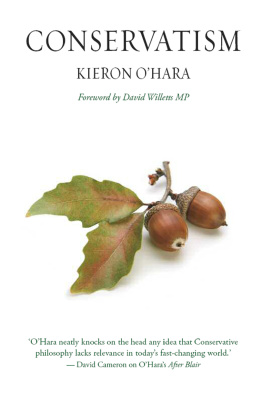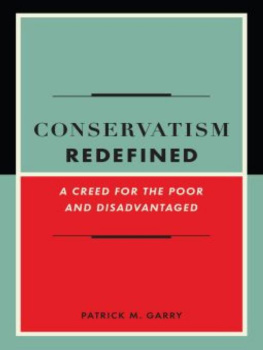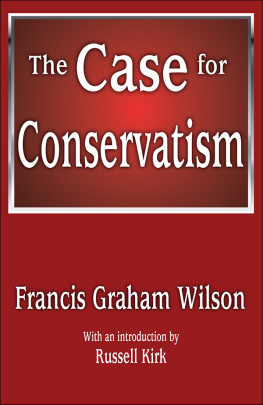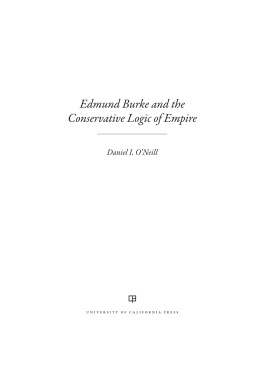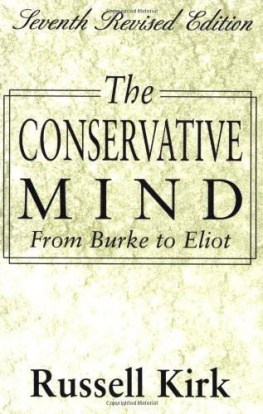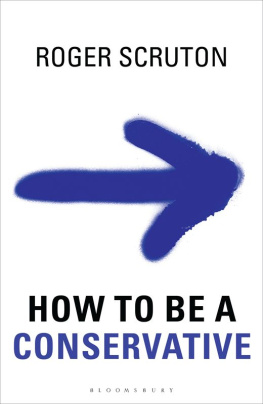CONSERVATISM
KIERON OHARA
REAKTION BOOKS
To Rebecca
Whose talents are very much appreciated
Published by Reaktion Books Ltd
33 Great Sutton Street
London EC1V 0DX, UK
www.reaktionbooks.co.uk
First published 2011
Copyright Kieron OHara 2011
All rights reserved
No part of this publication may be reproduced, stored in a retrieval system, or transmitted, in any form or by any means, electronic, mechanical, photocopying, recording or otherwise, without the prior permission of the publishers.
Page references in the Photo Acknowledgements and
Index match the printed edition of this book.
Printed and bound in Great Britain by CPI/Antony Rowe, Chippenham, Wiltshire
British Library Cataloguing in Publication Data
OHara, Kieron.
Conservatism.
1. Conservatism.
2. ConservatismHistory.
I. Title
320.52-dc22
eISBN: 9781861899835
Contents
Foreword
by The Rt Hon. David Willetts MP
Foreword
by The Rt Hon. David Willetts MP
Kieron OHara is becoming a distinctive and distinguished voice in contemporary Conservatism. His book Trust helps understand what holds society together. After Blair makes an attractive case for enlightened scepticism. This new book grapples with the challenge of defining Conservatism in an age when people will not be persuaded by unreflective appeals to tradition.
This book boldly identifies two principles at the heart of Conservatism. First, is the knowledge principle. Kieron OHara warns that as societies are complicated and dynamic there are limits to what we know. It is an attractive appeal for some humility in politics. It recognizes that, as David Cameron has argued, governments cant act like mainframe computers when we are already moving beyond the laptop to the tablet. Knowledge and power are dispersed and cannot be centralized.
I can still remember the excitement when I first read Friedrich Hayeks great essay, The Use of Knowledge in Society. That recognition of the limits to our knowledge has clearly had an important and benign influence on Kieron OHaras argument.
Hayek, however, famously went on to explain that he wasnt a Conservative, and Kieron OHara parts company with him in his second Conservative principle, what he calls the change principle. This argues that when it comes to social change society should be risk-averse, and ideally change should be incremental, reversible and rigorously evaluated. It makes the book sceptical even about free market reform. OHara puts strong and stable institutions at the heart of his picture of a good society, and he is wary of ambitious projects, however apparently rational, that might threaten them. This is indeed a distinctively Conservative argument and gives a consistency to Conservative political practice. OHara rightly quotes Quintin Hoggs warning to avoid extremes:
Conservatives think that the doctrinaire application of a political theory inevitably involves the statesman in extremes. In fighting socialism in the twentieth, as they fought liberalism in the nineteenth century, Conservatives will be found to have changed their front to meet a new danger, but not the ground they are defending.
OHara is eloquent on the need for scepticism and caution. Practising politicians, even Conservative ones, may feel this underestimates the need for practical measures to tackle the challenges facing our country. This is perhaps the distinction which OHara makes between big-C and small-c Conservatism. He is a small-c conservative.
This book clears away many misconceptions about Conservatism and ends with a brief account of what a Conservative programme in todays Britain might look like if it rested on OHaras two key principles. The agenda which he sketches out is balancing the budget, resting policy on evidence, going local, making information transparent, and balancing and preserving. It bears an uncanny resemblance to David Camerons Conservatism.
Kieron OHara has clearly been influenced by the argument that nowadays politicians have to appeal to public reason arguments that make sense to people regardless of their diverse cultural and religious backgrounds. Its a challenge which it can be particularly hard for Conservatives to rise to because we are so aware of the distinctive institutions and traditions of our own country. That rootedness in a particular national story is what makes it so hard to move between Conservatism in practice and Conservatism in principle. But I commend this excellent book for rising to that challenge.
London, March 2011
Introduction
Life in the twenty-first century is dynamic, complex and faster-moving than ever before, and the pace shows no sign of slowing. Yet here is a book about conservatism, the philosophy of caution about, maybe even suspicion of, change, particularly the revolutionary change which is the one thing most characteristic of our time. What possible relevance can such a retrospective way of thinking have in a forward-looking age?
I hope this book will answer that question but perhaps in unpredictable ways. Conservatism is indeed a political idea that problematizes change, but that does not render conservatives irrelevant. In fact, it makes them uniquely valuable in our whizz-bang world.
I will sketch out a political position that is relevant, perhaps a little novel in places, yet recognizably descended from the great thinkers and doers of the conservative tradition. I want to show what policies follow from conservative principles, and how these can be developed and adapted for the modern world. My aim is more descriptive than proselytizing this is not a manifesto but I do want the reader to close the book with a sense that conservatism is still plausible, germane and a potentially powerful tool for managing the dramatic upheavals of terrorism, technology, migration, climate, demography and the economy through which we are living. That entails not only setting out a conservative philosophy, but also suggesting how it could be applied to the major problems of our day.
This philosophy is intended to be applicable anywhere, from the US to Europe, from rich democracies to emerging ones. Its starting point, however, was British; my work in this area began in the dark days of 2002, when the British Conservative Party was in something of a mess and, as a result, the Labour government of Tony Blair was without serious opposition. This was bad for all sides, for a government needs confrontation and powerful debate to stimulate its own thinking; Blairs failings, to my mind, were at least partly caused by the Tories ineffectiveness.
At that time, the Conservatives were wrangling among themselves, squabbling over the inheritance of the giant figure of Margaret Thatcher, unable to see how far the world had moved since her extraordinary contribution to British politics. I thought I could discern a small-c conservative tradition, very different to Thatcherism (though supportive of it at times), which was more relevant to the post-Blair age. I gave that tradition voice, in a book called After Blair that at least some in the party enjoyed, and I would like to think that the pattern of Conservative thinking post-2005 has been influenced to some degree by that work. I tell everyone it has, anyway.
This book is a broader, deeper account of that philosophy. Indeed, whereas After Blair was a political book, the volume you hold in your hands (or which peers out at you from your Kindle so much has the world changed since 2005) is a work of philosophy pure and simple, although a philosophy with clear application to the world around us. It aspires no less to a definition of conservatism.

